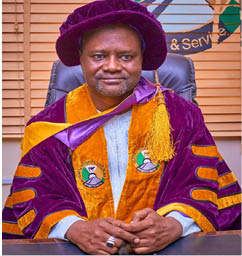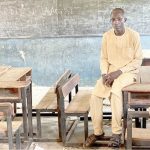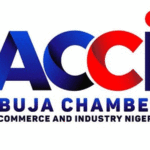Prof. Armaya’u Hamisu Bichi is the Vice-Chancellor of Federal University Dutsin-Ma in Katsina State. The professor of Fisheries, whose academic career spans over 30 years, in this interview, speaks on insecurity and how FUDMA has fared under him
How is FUDMA dealing with the issue of insecurity?
What we do here in Dutsin-Ma or in FUDMA is to keep on praying to God to protect us from all these problems. Of recent, we had some challenges, but we were able to mobilize our internal security for swift intervention. We collaborate with the local people and hire vigilantes to safeguard the students.
We have army, police, DSS, and civil defence in conjunction also with the vigilante group providing security. They are putting in a lot of effort and by the grace of God, we are able to curtail this until of recent.
- Katsina: Nigeria Customs returns seized food items to owners
- Israel uses starvation as ‘war arm’ – EU
We make sure that our students stay close to each other within the town, though some don’t heed our advice and stay far away from the hostel. We are making more hostels available for them. In fact, my house, the VCs residence here, I converted it into a female students’ hostel so that they can stay there and be safe.
I went into the town and rented an apartment where I am now staying. Even the registrar’s house, I converted it into a female hostel all these so that we keep our students safe. We are trying to improve by building more hostels. By the grace of God, we will continue to stay peacefully within the campus. The National Security Adviser is greatly assisting us alongside several security agencies and we are grateful to them all.
Since you assumed duty as vice-chancellor, how has the varsity fared?
Since my assumption of office about three and a half years ago, I have been able to stabilize the system. When I came on board, there was a lot of division between staff and students. But with the help of God, I am able to stabilise, and settle differences, between people that have varying views and make them understand that this is where we should build academic excellence.
We were able to do that and now people are happy and united.
In terms of academic programmes, we were able to make sure that we have a system where we follow the calendar strictly. As at today, we have finished the session and we have begun a new session. I think this is the only university, or one among the very few that maintains a calendar for the university system as approved by the National Universities Commission (NUC).
When I assumed office, I was able to increase the number of undergraduate programmes to more than 90 and postgraduate programmes to more than 60 and all of them have been given full accreditation by the NUC. We have introduced many new programmes also, which will be of economic benefit to Katsina State and Nigeria as a whole.
The university is witnessing a lot of infrastructural development, how are you able to achieve this?
In terms of that, we have done better than any other VC of this university. If you go round here, you will see new academic buildings coming up and if you go to the main campus you will see new centres and faculties, many hostels being built. As at now, at the take-off campus, we are building more than three female hostels and in our main campus, we are building more than four including many classes, many auditoriums and many faculty buildings.
If you compare this my three years in office and the years the university was established, I’m sure you will see quite clearly the rate of my performance.
What will interest you is that we have the lowest student registration fees in the country, and through our Internally Generated Revenue (IGR) we have been able to accomplish many projects which include, three female hostels with each having a capacity of 360-bed space; two 250 seats capacity auditoriums, two storey building blocks University Staff Junior Secondary School, a multi-purpose laboratory as well as many other structures that are at various stages of completion.
What would you say in the area of manpower and staff development in the varsity?
The manpower of the university I think is okay for now. Though because of the new programmes we established, we had to look for more experts. We recently held interviews for staff that will occupy various positions in the new programmes.
We have, for example, the school of health sciences, faculty of law, faculty of engineering.
In terms of staff development, we have more than 150 staff right now in various universities in Nigeria and abroad studying to further their education so that we can have competent people to man our programmes.
With every success comes a challenge, what are yours presently?
The major problem so far is the issue of security. I hardly sleep at night, always checking my phone to see if the director of security has called me or any of the security agencies in Dutsin-Ma working round the clock to safeguard the students and the towns had called.
I check my phone every one to two hours to see if there is any distress call. This is very disturbing; I didn’t sleep fully until the morning when I didn’t receive any call from these people. So we are praying. With what the state governor is doing in terms of security, we are hopeful that this will be a thing of the past. The second problem is that of lack of sufficient funds to do more and more projects.
What informed your decision in setting up the School of Health Sciences?
Health is wealth and we all need a healthy nation with healthy people to prosper. This is a dear project so I was keen to ensure we have such a school here. The dearth of health workers is worrisome to all and the statistics of people to health workers is alarming.
Manpower is critical to advancing health service delivery. Having realized this, I swung into action to see to the setting up of this school to boost our manpower towards better health service delivery. We were able to establish the College of Health Sciences three years ago and the students are in their second year.
We are conducting admission for another set. We have programmes like Nursing, Physiotherapy, Anatomy, Physiology, Radiography and Medical lab sciences. This will help Katsina State and the country in general in filling vacancies in these areas, in which manpower is scarce. This is a great improvement for Katsina, the North West and the country in general.
What is the relationship between FUDMA and its host community like?
We are doing well in that area. We have the Directorate for Gender Studies, where they are looking at the issue of girl child education. We go round to see girls that are out of school, we talk to their parents and if they agree we take the children back to school and pay for all they want, either in primary or secondary school.
Apart from that, we have a medical outreach through which, from time to time, we go around the town and some villages and give them free medical care. We are also conducting a train-the-trainer programme in which we teach teachers of primary and secondary schools so as to improve their English proficiency, mathematics and ICT competence.
You also established the Centre for Quranic Research and Studies, what was the motivation?
Katsina State is a centre of learning, even the modern education system in this area started from Katsina with the Katsina College and other schools.
Also, Katsina State is the centre of Islamic modernization where we have a lot of school teachers, highly competent Islamic scholars and many Islamiyya schools as well. Based on that, we looked around and saw that there was no modern institution around the North West where research could be done on Quranic education, Quranic Research and Quranic memorization.
You have to go to the North East to find that. So, because of the high demand in Katsina and the neighbouring states, we feel there is a need to have the centre so that our young scholars can learn to memorise the Quran very quickly.
We have staff that studied in Cairo where modern Quranic memorisation takes place. They came with technology with which if they put you in class, in less than six months, one can memorise the Quran. They are doing it here in conjunction with Islamic scholars that are in Katsina and we are seeing the impact.
How is FUDMA keying into this renewed drive for agriculture?
When I was the Dean of Agriculture, we did a lot of things. We looked at Katsina State as an agrarian state and saw the need to help farmers turn away from local ways of farming. We looked at the modern world, agriculture has been turned into a commercial thing where you come and invest your money to get more money, not just for farming to feed oneself.
Even after feeding yourself, there is need for you to sell the extra and get more money for the household. The problem of agriculture now is more on the type of seeds that can mature within the shortest period of time and produce in large quantities.
So we want to ensure that the farmer would not waste time on the farm and will also spend little money because the time of production has been shortened and it also cuts down risks.
Our local seeds can cause you to lose investment. Because if the rainfall doesn’t last long, at the end of the day, your farm may not produce enough yield.
So we produced seeds that can mature early are resistant to diseases and can produce much yield. For example, there is one which we produced in Makera in Dutsin-Ma Local Government called Kaddadon, which can double the yield in a hectare, compared with the local seed. People there are making good money.
We have an extension of a modern village in Makera where we train the local people, especially youths and rural women, to produce enough yield and to raise farm animals. The manure they get from them they use on their farms.
When I became the vice chancellor, I set up the Sudano Sahelian Centre for Agricultural Research where we look at the rainfall pattern and advise farmers ahead on rainfall pattern; if it will start early and finish early, or will last for so and so months. This helps them plan their farming pattern.
We are working further on this with the support of the Katsina State government and as I speak to you now, we are in the process of getting the Katsina Shanghai Center, which is located in Dutsin-Ma to help boost the agricultural capacity of the state.

 Join Daily Trust WhatsApp Community For Quick Access To News and Happenings Around You.
Join Daily Trust WhatsApp Community For Quick Access To News and Happenings Around You.


